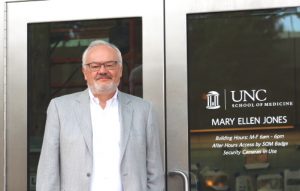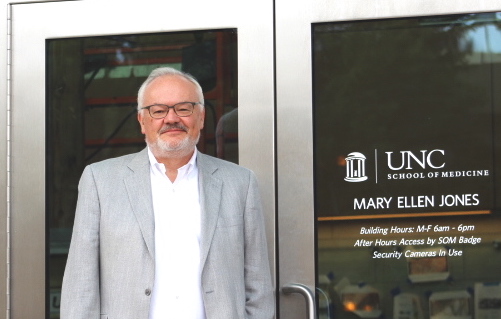The UNC Department of Medicine announces the formation of the new UNC Blood Research Center (UNC BRC), administratively housed within the division of hematology and oncology. Nigel Key, MD, the Harold R. Roberts Distinguished Professor of Medicine, Pathology and Laboratory Medicine will serve as director.

The UNC Department of Medicine announces the formation of the new UNC Blood Research Center (UNC BRC), administratively housed within the division of hematology and oncology. Nigel Key, MD, the Harold R. Roberts Distinguished Professor of Medicine, Pathology and Laboratory Medicine will serve as director.

With faculty participation from medicine, pediatrics, pathology and biochemistry, the UNC Blood Research Center will promote basic and clinical research in non-malignant blood disorders, building on ground-breaking discoveries that laid the foundation for UNC’s translational research excellence.
“UNC has a world-renowned reputation for research in blood disorders, established by hematology giants,” said Ron Falk, MD, chair of the department of medicine. “Blood research impacts multiple areas of medicine, and the tools required to study the clinical applications are rapidly expanding. This is the perfect time to introduce a renewed focus on dedicated research in blood disorders.”
The formation of the Center comes with exceptional opportunities to extend the reputation of UNC with rapid scientific developments in the field, recent faculty recruitments, and newly-dedicated contiguous laboratory space in the Mary Ellen Jones Building.
“Even though this is an area of traditional strength at UNC, there hasn’t been an integrated, multi-disciplinary focus on blood research for almost 20 years,” said Key. “We are delighted to formalize a new Center for research excellence that will strategically align our hematology research activities and support subspecialty training, which is central to treating patients with non-malignant blood disorders.”
Research focus areas will include thrombosis and hemostasis, hereditary hemorrhagic telangiectasia, hemoglobinopathies (including sickle cell disease), the Francis Owen Blood Research Laboratory, transfusion medicine, apheresis and immunohematology.
UNC has a unique history and is responsible for landmark scientific discoveries and contributions to thrombosis and hemostasis. The program has its roots in the late 1940s when Brinkhous, Wagner, Langdell, Graham and others began their pioneering investigations in hemophilia, with notable milestones. Gene Orringer, MD, led the sickle cell disease program that was widely recognized as an elite national center in clinical care and research. In 1978, Harold Roberts, MD, founded the UNC Center for Thrombosis and Hemostasis which was later incorporated into the Carolina Cardiovascular Biology Center, and then became the McAllister Heart Institute (MHI) in 2009. Although the MHI’s scientific focus in cardiovascular biology overlaps with research on blood disorders, the return to a dedicated center will strengthen the visibility of blood research and integrate ongoing work, resulting in greater opportunities for funding and philanthropic support.